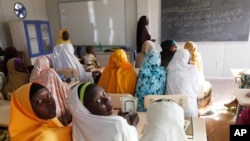A United Nations Children's Fund (UNICEF) report published this month states that a million children lack education as 2000 schools have been closed in Cameroon, Nigeria, Niger and Chad, countries that have been suffering from the Boko Haram insurgency. The military has been encouraging children who escaped after their schools were destroyed in Far Northern Cameroon to return. Some are seeking education in safer locations.
Kwene Ekwelle, one of the senior commanders of Cameroon troops fighting the Boko Haram insurgency, pleads with villagers of Kerawa on Cameroon's northern border with Nigeria's Borno state to send their children to school.
He said the Cameroon military is meeting the villagers to assure them of their protection from Boko Haram fighters and encourage parents to bring their children back to schools from where ever they are hiding. He said they are fighting Boko Haram so that every Cameroonian child should go to school, every farmer should work freely in his farm and people should go around freely. He added that the villagers should have confidence in their military.
War zone
The remote Kerawa village has been a war zone since Boko Haram extended its attacks from Nigeria to Cameroon in a bid to create an Islamist state three years ago. Two schools in the area were burnt by the insurgents in December last year.
Ibrahim Joel Mahamat, Cameroon's far north regional delegate for basic education, said hundreds of the villages' school goers fled to safer locations in Cameroon's hinterlands.
He said that since April of this past year, more than 33,000 primary school children have been displaced by the Boko Haram insurgency in the far north region of Cameroon.
Among the students who have escaped and are seeking education in safer areas is Mboake David. The 17-year-old, now studying at a government bilingual high school in Maroua, does not imagine returning to his village soon.
He said he cannot risk his life by returning to his village where there is war.
Philomene Mebenga, one of the head teachers in Maroua, said they have received instructions from the government of Cameroon to admit all children fleeing Boko Haram even if classrooms are congested.
She said the children like all other Cameroonian children need education and as such should not be denied that basic right under the pretext that classrooms are already congested. She said she encourages the children not to lose hope and tells them they will be able to go back to their villages when peace returns.
In March 2015, Cameroon launched an $8 million emergency plan to construct schools in safer localities away from volatile areas overrun by Boko Haram. Facilities including 200 classrooms, dormitories and latrines for 70,000 students were to be built.
This month UNICEF said more than 2,000 schools have been closed in Nigeria, Cameroon, Chad and Niger, while hundreds of others have been attacked, looted, or set on fire by Boko Haram fighters in their quest to create an independent Islamic state.
Both Cameroon and the U.N. agency have been expressing fears that lack of education may fuel further radicalism especially now that Boko Haram has been recruiting child suicide bombers.




